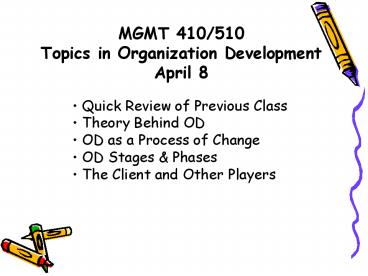MGMT 410510
1 / 19
Title: MGMT 410510
1
MGMT 410/510 Topics in Organization
Development April 8
- Quick Review of Previous Class
- Theory Behind OD
- OD as a Process of Change
- OD Stages Phases
- The Client and Other Players
2
Characteristics of OD?
- Leading Change
- Collaborative
- Performance
- Humanistic Relationships
- Systems Interdependencies
- Scientific
Don Harvey Donald R. Brown
3
What is OD?
"Organization development is a system-wide
application of behavioral science knowledge to
the planned development and reinforcement of
organizational strategies, structures, and
processes for improving an organization's
effectiveness." (Cummings and
Worley)
OD is a planned process of change in an
organizations culture through the utilization of
behavioral science technologies, research and
theory.
(Burke)
4
Emergence of OD
- The need for new organizational forms
- The focus on cultural change
- The increase in social awareness
-
Warren Bennis
5
Characteristics of Effective Organizations
- Less hierarchical more networked
- Involve members in decisions they are
- expected to implement
- In general, more people oriented
- Flexible in how work is done
- Encourage innovation
- Posses greater information flow
Burke
6
Dimensions of and Organization
Linkageinc.com
7
Organization as a System
Transformation Process
Inputs Information Equipment Facilities Materials
Money People Technology
Outputs Products Goods Services
Organization
Human Resources Workplace Actions Physical
Resources
People
Environmental Feedback
Don Harvey Donald R. Brown
8
Where does OD Come From?
- Sensitivity Training
- Sociotechnical Systems
- Survey Feedback
Burke
9
Theorists Whove Influenced OD
- Individual Perspective
- Maslow Herzberg emphasis on individual needs
- Vroom Lawler emphasis on expectancies
values - Hackman Oldham emphasis on job satisfaction
- Skinner emphasis on individual performance
Burke
10
Theorists Whove Influenced OD
- Group Perspective
- Lewin emphasis on norms values
- Argyris interpersonal competence values
- Bion group unconscious, psychoanalytic basis
Burke
11
Theorists Whove Influenced OD
- System Perspective
- Likert emphasis management style approach
- Lawrence Lorsch Organizational structure
- Levinson Organization as a family
Burke
12
Case Review Exercise
- Discussion Questions
- What is the key issue(s) of the case?
- Consider the theories discussed, which help
- you to understand what is going on? Why?
- Applying the theories discussed, what might
- you do to resolve the issue(s)? Why?
13
OD as a Process of Change
Burke
14
OD as a Process of Change
- Phases of Planned change
- Development of need for change
- Establish a change relationship
- Work toward change
- Generalization stabilization of change
- Achieving a terminal relationship
Burke
15
OD Stages Phases
1. Entry
STAGE 1 Anticipate Need for Change
2. Contracting
7. Evaluation
STAGE 2 Develop Consultant Client Relationship
STAGE 5 Monitoring Stabilizing
STAGE 6 Continuous Improvement
6. Intervention
3. Diagnosis
STAGE 4 Action Phase
STAGE 3 Diagnostic Phase
4. Feedback
5. Planning change
Burke
Don Harvey Donald R. Brown
16
Case Review Exercise
- Discussion Questions
- Image you are an OD Consultant assigned to the
case What steps you would take to resolve this
case?
17
Defining the Client
- Contact clientsindividual who defines the
- project/or contracts with a consultant
- Intermediate clientssenior management
- Primary clientsthose that own the problem
- Ultimate clientslarger context thats impacted
- by the project, often the entire organization
18
Defining the Client
I have come to think of my client as the
relationship and/or interface between individuals
and units within and related to the system.
Burke
President
VP Finance
VP Operations
VP Admin.
VP Engineering
19
Other Participant Roles
- Project Sponsor sufficient authority to
authorize change - Project Leader/Manager authority
- responsibility to lead project
- Consultant provide process and technical
expertise - Change Agent vision for change, implementer,
communicator - Process Owner(s) responsible for products or
services produced by key processes being reviewed































